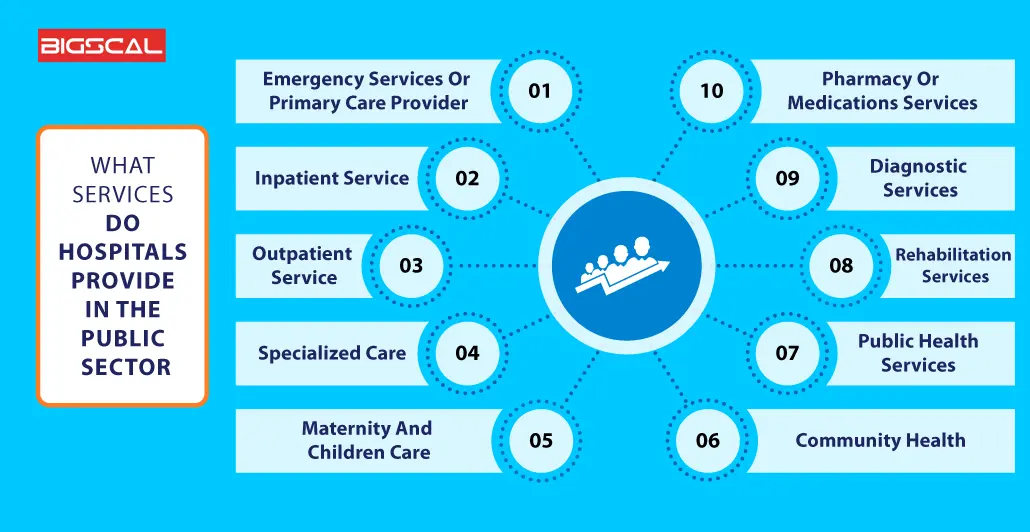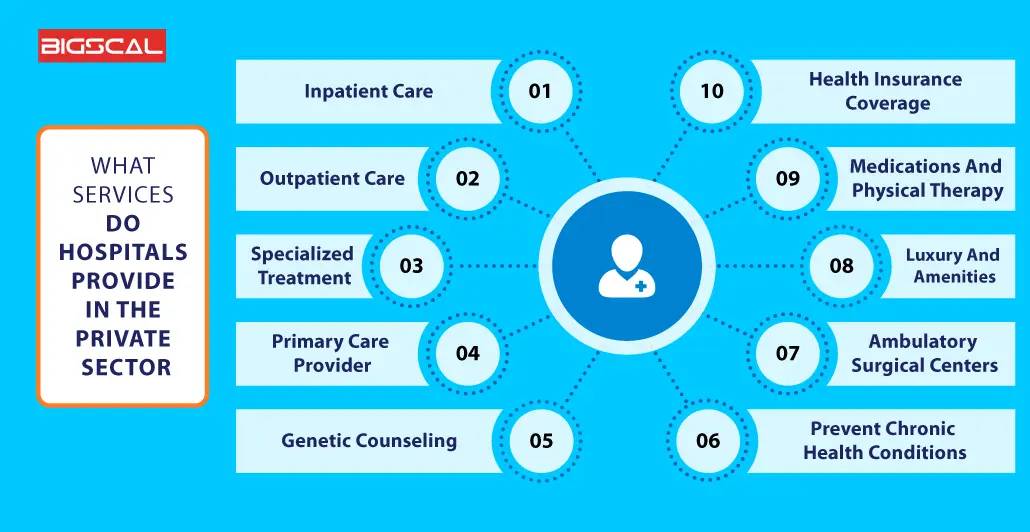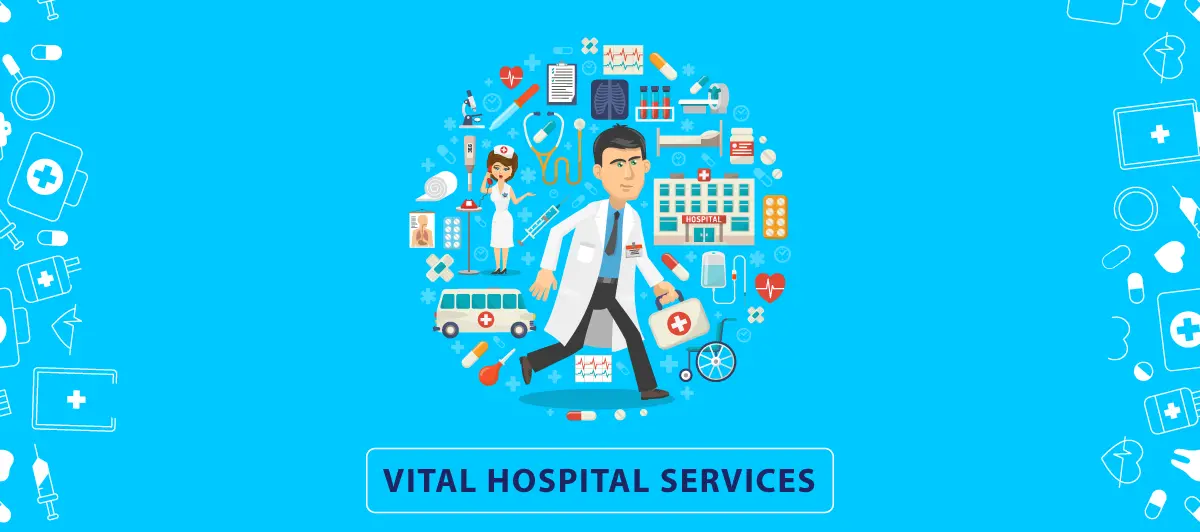What Services Do Hospitals Provide: Know Each Essential Service
Quick Summary: Discover what services do hospitals provide and what is their actual role in health care, from delivering comprehensive care to rehabilitation and mental health support, aiding recovery and well-being. From emergency care and surgeries to diagnostic tests, hospitals ensure prompt medical attention. Hospital services are pillars of health care, ensuring you receive the care you need when you need it. Read More about the medical services.
Introduction
Hospitals are essential pillars of our health care system. They provide a wide range of services to keep us healthy and cared for in times of illness or injury. These medical institutions serve as hubs of healing, with managed care by dedicated professionals, from doctors and nurses to technicians and support staff for medical equipment, all working together to ensure our well-being.
As you know, there is a tremendous advancement in the healthcare organization that increases their work quality. Mainly, the healthcare information management system has been installed in every hospital and they foster innumerable advantages across all divisions. Enhancing the administrative sector, improving financial systems, and advancing clinical systems. Additionally, it improves the medical documents and adherence to all protocols.
But What Services do Hospitals provide mainly? And what health care services or benefits do we get from public sector hospitals or private sector hospitals?
Curious to know?
So, We are here to discuss all the health care services provided by hospitals in both public and private sectors. From emergency care, which can mean the difference between life and death, to the intricacies of surgical procedures, preventive medicine, and even psychological support – hospitals are community health centers of primary care physicians, surgical services, medical facilities, and innovative technology.
Keep reading to understand why hospitals are important and what do hospitals provide!
An Overview Of Hospital Services?
Hospital services, whether in the private sector or public sector, are the bedrock of a nation’s healthcare delivery system, and their importance cannot be overstated. In both sectors, hospitals offer a lifeline to individuals in need, providing a diverse range of essential healthcare services and research that safeguard and enhance the well-being of communities.
The private sector hospitals, driven by competition and innovation, offer the latest medical technologies and personalized care. Patients often choose these institutions for their shorter wait times, luxurious amenities, and access to renowned specialists. While it comes with a price tag, the private sector ensures a premium healthcare experience for those who can afford it. Additionally, they use many hospitals’ management software to organize their data. If you are now thinking how they build such software. Then here is your answer. They take the help of an IT firm that develops hospital management software.
On the other hand, public sector hospitals uphold the principle of healthcare as a fundamental right. They serve as safety nets for vulnerable and underserved populations, offering comprehensive health care services research regardless of a patient’s financial means. These institutions play a pivotal role in becoming social workers and promoting equity and access to healthcare services.
Public and private sector, both of their own merits and demerits. In short, public sectors are better for the lower section of society but their facilities and infrastructure are not satisfactory. Private sectors are available for patients at a time and have great healthcare facilities that are impossible with public sectors but costly ones.
Hospital Different Departments
For putting the patient in hospitals, patients are placed in the departments which relate to the particular field of medicine. These units grant specialized 24/7 care for the patients, while the departments of cardiology, neurology, orthopedics, and pediatrics are some examples. Each department is staffed with knowledgeable staff who give each patient different health services and treatment bespoke to their conditions thereby giving each patient the best possible hospital products and services for their specified health concerns.
Diverse units are necessary for different patient problems. All healthcare specialists cannot sit in one room. They need a department due to their different practices and simplify to administer their activities. Let’s watch the diverse department in brief for better understanding :
- Cardiology ward with a focus on heart conditions
- A neurology department to address neurological disorders.
- Gynecology for women health related issues
- Department of Orthopedics for musculoskeletal disorders.
- Pediatrics department there children under 14 years of juvenile health care.
What Services Do Hospitals Provide In the Public Sector

You all must know about public sector hospitals or government hospitals. but always be curious to know what do hospitals do. So, here is a list of various types of services and treatment you can get healthcare access from government hospitals at low cost than private hospitals.
Emergency Services Or Primary Care Provider
The urgency of emergency care that saves the life of a patient in the public hospitals is unparalleled to cases of heart attacks, accidents or injury. Aside from that, they’re a widely utilized ambulatory care facility, where an individual is not only able to get medical hospital services or vaccinations but can also be treated for common illnesses. As a result, people in everybody age group within a community have such health services that even the most critical of emergency services are available to them.
Inpatient Service
Inpatient services at public hospitals are where patients are admitted for overnights or rounds of treatment and stay for a while. Patient services in hospital cover different categories of the health services, such as surgeries, post-operative care, chronic management through medication administration and others. Hospitals provide adjustable beds rooms and a specialized medical staff or a treatment from doctor’ other to ensure the visitations of people and their health being taken care of for the recovering period.
Outpatient Service
The outpatient services provide emergency care without any need for the people to stay overnight. This includes everyday visits to the doctor, diagnostic tests sitting at the waiting areas for hours, and later a simple procedure of stitching, or vaccinations. Outpatient and general health care services operated by public hospitals are widely available to individuals according to their appointments that help to fight various health issues quickly and effectively, increasing people’s accessibility to health care.
Specialized Care
Two of the most important services that public hospital care offer are cardiology and neurology as well as oncology and other specializations. Such disciplines are populated by the professionals well versed in the specific diseases of concern. Developed cases of illnesses as well as chronic ailments can be handled using this service through specialized treatments, surgeries, and therapies to enhance their general well-being and quality of life.
Maternity And Children Care
Public hospitals provide many services for expectant mothers and children. Maternal services are a type of care that covers the delivery, postpartum care, and prenatal care phases. The main objective of these kinds of services is to provide good maternal and neonatal care at a lower cost. Treatment and prevention of child diseases in children’s hospitals include pediatric services, vaccination, and therapy provided for childhood. These services focus on comprehensive health and development of infants and kids. Therefore families can work and sleep knowing that something is done from their baby’s health when it comes to health.
Community Health
The focus of public hospitals in community health work is on participation. They offer health education classes, conduct wellness check-offs and screening detections among the residents. These efforts are centered on educating people about the benefits of managing healthy lifestyle as well as preventing diseases and raising awareness of topical health issues. This Public hospital address problems identified among the local community, so they are very important in meeting community health needs.
Public Health Services Or Programs
Public hospitals in cooperation with the public health agencies aim to carry on the health care programs that enable the population’s welfare. These programs tend to encompass disease surveillance activity, immunization campaigns, and reaction against public health problems, like epidemics and pandemics. Public health facilities offering essential public health services are principal in preserving the health of the community that serves all the people and communities they serve.
Mental Health And Rehabilitation Services
Public hospitals offer services with mental health function in the treatment of people who are battling psychological challenges like depression in men, anxiety, or drug abuse. Along with that, they are contributors to the recovery process of patients from serious injuries or surgeries as they offer services like physical therapy, occupational therapy, and speech therapy. These services help patients in re-establishing their independence and enhance a positive feeling of both mentally and physically.
Diagnostic Services
Diagnostic services in public hospitals range from basic tests to complicated and advanced imaging and monitoring techniques in order to detect and manage a broad range of diseases. It, includes medical images (radiographs, MRI, CT scan) and lab tests (blood tests, biopsies), as well as diagnostic consultations. These services play a crucial role in accurate disease diagnosis and treatment planning, helping medical professionals provide the best care possible.
Pharmacy Or Medications Services
Pharmacies facilities available in hospitals where people can obtain prescribed medications and expert guidance on their proper use. Pharmacists ensure that people understand their medications, potential side effects, and interactions. This service is essential to people for managing chronic conditions, post-surgery recovery, and general health maintenance, ensuring that people receive safe and effective medications as part of their treatment.
What Services Do Hospitals Provide: In the Private Sector

Talking about the Private hospitals, one thing that pops into our mind right away is that they will give their best medical services to their patients. To understand these hospitals service area we are going to make a point by point mention.
Inpatient Care
Like many public or governmental hospitals, New hospitals extend services to inpatients. That is to say, they care for patients who are in hospital for the night or have to stay longer term. Here, healthcare providers do open surgeries, complex procedures, provide treatments to severe patients, all requiring prolonged monitoring. One of the advantages of private hospitals in providing comfort to patients recovering from an illness, is the wide range of facilities a patient is offered from many private rooms and amenities to a dedicated medical team believing these patients deserve the best attention.
Outpatient Care
Outpatient treatment in private hospitals is an option whereby the patients do not have to stay overnight when they come in for this kind of care. It implies seeing a doctor, taking some diagnostic test, and undergoing minor surgeries as well as different therapies. patients can be seen at the hospital, have their medical treatment and be released from hospital all on the same day. Non-governmental hospitals are usually tailored to the efficiency and convenience of the outpatient services and this ensures that patients will access the quality health care services without the need for disrupting the normal ordered things.
Specialized Treatment
Ranging from the world-class amenities to specialized services in fields such as cardiology, orthopedics, oncology, and so much more, Private hospitals have received a reputation of exceptional service in these fields. These kinds ofhspecial divisions of hospitals are full of resident physicians who are experts in their specialties and equipped with advanced technology to provide the most efficient diagnostic and treatment for certain diseases. For patients requiring super-specialized treatment, such as the use of sophisticated health technology and a team of professionals day and night will be of a great help.
Primary Care Provider
Some private hospitals also function as primary care providers. This means they treat routine health care services like check-ups, vaccinations, and treatment for common illnesses. Patients can establish an ongoing relationship with a primary care physician at a private hospital, a doctor who can provide comprehensive health care and referrals to specialists when needed, ensuring continuity of care.
Genetic Counseling
Private hospitals often offer genetic counseling services to individuals and families with a history of genetic disorders or illness or those interested in understanding their genetic predispositions. Genetic counselors provide information and consultation on the risks, testing options, and implications of genetic conditions. This service helps patients make informed decisions about their health and family planning, offering valuable insights into their genetic makeup and potential health risks.
Health Insurance Coverage
Private hospitals often work closely with various health insurance providers. They accept a wide range of health insurance plans, making healthcare more accessible and affordable for patients. This means that individuals with insurance coverage can receive health services at these hospitals with reduced out-of-pocket expenses, ensuring financial support for their health care needs.
Medications Or Medical Facility And Physical Therapy
Private hospitals have on-site pharmacies where patients can conveniently obtain prescribed medications. Additionally, there is hospital facilities list, including state-of-the-art diagnostic equipment, specialized treatment centers, and innovative technology, to offer patients comprehensive and high-quality health care.
Private hospitals often provide physio therapy services to help patients recover from injuries, surgeries, or health conditions. physical therapist create personalized rehabilitation plans that include exercises and treatments to improve mobility, reduce pain, and enhance the patient’s overall body function. These services aid in the recovery process and contribute to patients regaining their independence and quality of life.
Luxury And Amenities
Some private hospital offer luxury amenities and a more comfortable environment for patients. This may include private rooms, gourmet dining options, spa-like settings, and concierge services. These amenities aim to enhance the patient’s experience and comfort during their hospital stay.
Ambulatory Surgical Centers
Private hospital often have ambulatory surgical centers within their facilities. These centers are designed for same-day surgical procedures that do not require overnight stays. Patients benefit from efficient and special care in a comfortable setting, and they can return home on the same day, minimizing disruption to their daily lives.
Prevent Chronic Health Conditions
Private hospital emphasize preventive Medicare measures to help patients avoid chronic health conditions. They provide wellness programs, health screenings, counseling, and health education to promote healthy lifestyles.
How Do Private Hospitals Manage Their Hospitals?
As you have read very early, private hospitals use hospital management software. So, Let me now define what is hospital management software:
Hospital management software, also known as healthcare management software or hospital information system (HIS). This software is specifically used to streamline and automate various administrative, operational, and clinical processes within a healthcare facility, such as hospitals, clinics, and health centers.
Key features of hospital management software typically include:
Hospital management software helps healthcare facilities improve efficiency, reduce paperwork, enhance patient care, and maintain accurate records. It plays a crucial role in modern healthcare management by promoting better coordination among various departments and improving the overall patient experience. See its key features:
- Patient Registration: It manages patient demographics, admissions, and records.
- Appointment Scheduling: Helps in scheduling patient appointments with doctors and other services.
- Billing and Invoicing: Handles billing, insurance claims, and financial transactions.
- Electronic Health Records Software (EHR): Stores and manages patient medical records electronically.
- Inventory Management: Tracks and manages medical supplies and equipment.
- Pharmacy Management: Manages pharmacy inventory and prescriptions.
- Laboratory Information System (LIS): Handles lab test orders and results.
- Radiology Information System (RIS): Manages radiology department workflows.
- Electronic Prescriptions: Enables doctors to electronically prescribe medicines.
- Staff and HR Management: Manages staff schedules, payroll, and HR-related tasks.
- Analytics and Reporting: Generate reports and analytics for data-driven decision-making.
- Security and Compliance: : Ensures data security and compliance with healthcare regulations.
Conclusion
As we are summing it up, I hope you now understand what services hospitals provide. Whether it’s private or government hospitals, they both provide numerous services to their patients. So, whether for routine check-ups or critical interventions, hospitals stand ready to serve or treat and safeguard our health.
FAQ
What are 5 examples of services that a hospital would provide?
Hospital offer a range of critical medical and surgical services, including:
- Emergency Care
- Surgery
- Diagnostic Imaging
- Maternity Services
- Inpatient Care
What are services in healthcare?
Healthcare services encompass a broad spectrum of medical and wellness offerings provided by healthcare professionals and facilities. These include preventive care, diagnostics, treatment, surgery, rehabilitation, mental health services, and home care, healthcare, and more. They aim to maintain and improve individuals’ health, diagnose and manage illnesses, and enhance overall health.
What services are typically provided by the healthcare industry?
The healthcare industry offers a wide array various types of services, such as:
- Primary Care
- Specialist Care
- Hospital Services
- Diagnostic Services
- Preventive Care
What are the 4 major services in healthcare?
- Preventive Care: Focused on disease prevention and wellness.
- Diagnostic and Treatment Services: Identifying and addressing medical conditions.
- Emergency Care: Immediate medical attention for critical situations.
- Long-Term Care: Ongoing care for chronic conditions and rehabilitation.
What are the 5 types of healthcare?
- Primary Care: General healthcare is provided by family doctors and primary care physicians.
- Secondary Care: Specialized care from specialists upon referral.
- Tertiary Care: Complex, advanced care from specialized hospitals or centers.
- Quaternary Care: Highly special care, often research-based.
- Home and Community Care: Care provided at home or in community settings, like nursing homes.





